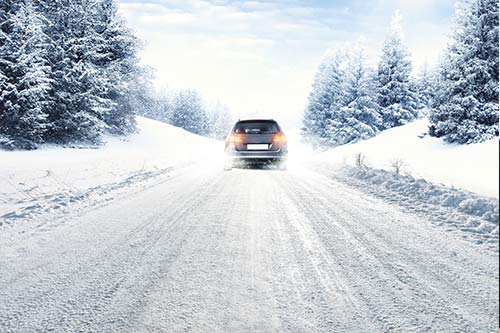The calendar may say we’re on the doorstep of spring, but winter driving conditions remain a fact of life in Colorado’s high country for many weeks to come. In recent years the state has made some significant changes in laws related to winter driving, changes designed to make a trip to the mountains (or even across town) safer for everyone.
Here are a few tips to help get you through the ice and snow while we’re all waiting on summer to arrive.
The Tandem Snowplow Law
A law passed in 2019, House Bill 19-1265, increased the penalties for motorists who pass snowplows that are operating in tandem or “echelon” formation — in other words, when two or more plows are staggered diagonally to plow multiple lanes at the same time. It’s now a Class A traffic offense to pass a snowplow when the truck is displaying its lights and operating in tandem. Doing so could not only result in a fine and points on your driver’s license, but it’s extremely dangerous; you could encounter whiteout conditions and ridges of snow on the road if you try to maneuver around plows at work.
Whether in tandem or not, snowplows should always be given a wide berth. Make sure to stay at least 3-4 car lengths behind an operating plow, to avoid de-icer and sand hitting your vehicle. Be prepared for sudden stops. And never pass a plow on the right; they are designed to push all the snow, slush, rocks and debris in that direction.
The Mountain Traction Law
The Colorado Department of Transportation has long had the authority to require that certain vehicles carry special traction equipment, such as tire chains, during weather emergencies. What’s different about Colorado’s mountain traction law, which went into effect in August 2019, is that it imposes a season-long requirement for drivers on a 126-mile stretch of the I-70 mountain corridor, from Dotsero to Morrison. From September through May, I-70 drivers are required to have either snow tires, tires designated for mud and snow (“M+S” tires), or four-wheel or all-wheel drive vehicles. In addition, the minimum amount of tread required for tires on snowy roads across the state is now 3/16 of an inch, up from a previous 1/8-inch requirement.
Although the data isn’t in yet, the traction law is expected to help ease congestion by discouraging those with bald tires or two-wheel drive from driving in conditions for which they are not equipped. During severe storms, CDOT can also require passenger vehicles to put on chains, just like the big rigs. The penalty for ignoring traction requirements can be steep, from a basic fine of $130 to one of more than $650 if a motorist without sufficient traction gets stuck and blocks the roadway.
Keeping Warm and Safe in the High Country
It’s always a good idea to pack gear for emergencies when you head to the mountains — blankets, water, snacks, flashlight, shovel, cell phone — and have a backup route in mind if you run into closures or heavy delays. CDOT’s Winter Wise campaign also recommends:
- Avoid traveling during peak times. The Goi70 website provides weekend travel forecasts to help you plan your trip.
- When possible, use public transit for a safe, hassle-free ride. Bustang offers regular service to popular mountain destinations and Bustang Outrider makes a circuit in rural areas.
- Don’t be alarmed if you encounter a brief delay at the Eisenhower Tunnel; CDOT’s safety metering program helps control traffic low, reduces accidents, and keeps the tunnel clear for emergency vehicles.
- Be patient and give yourself more time than you think you need.
The Truck Accident Attorneys at Franklin D. Azar & Associates
For more than thirty years the attorneys at Franklin D. Azar & Associates have helped thousands of injured people obtain complete and timely compensation for their losses. Our proven track record and expertise have allowed us to grow into the largest personal-injury law firm in Colorado, with offices in Denver, Aurora, Thornton, Fort Collins, Greeley, Grand Junction, Colorado Springs, and Pueblo. If you’ve been injured in a bus, car, truck, or motorcycle accident, you may be entitled to compensation. Please call the truck accident attorneys at FDAzar day or night at (303) 900-5595 or contact us here for a free consultation and no-obligation evaluation of your case.



